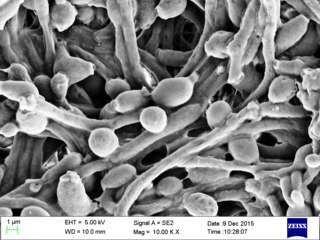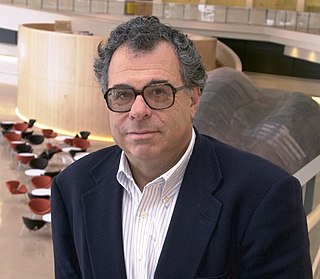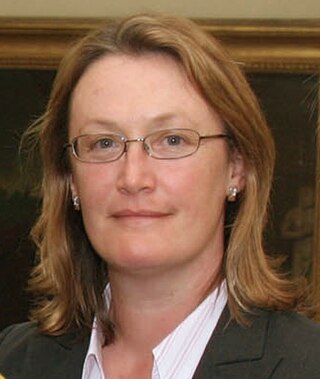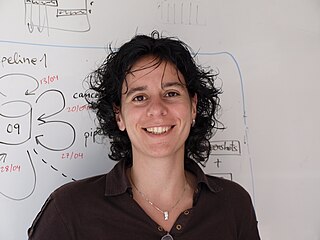Related Research Articles

Candida albicans is an opportunistic pathogenic yeast that is a common member of the human gut flora. It can also survive outside the human body. It is detected in the gastrointestinal tract and mouth in 40–60% of healthy adults. It is usually a commensal organism, but it can become pathogenic in immunocompromised individuals under a variety of conditions. It is one of the few species of the genus Candida that cause the human infection candidiasis, which results from an overgrowth of the fungus. Candidiasis is, for example, often observed in HIV-infected patients. C. albicans is the most common fungal species isolated from biofilms either formed on (permanent) implanted medical devices or on human tissue. C. albicans, C. tropicalis, C. parapsilosis, and C. glabrata are together responsible for 50–90% of all cases of candidiasis in humans. A mortality rate of 40% has been reported for patients with systemic candidiasis due to C. albicans. By one estimate, invasive candidiasis contracted in a hospital causes 2,800 to 11,200 deaths yearly in the US. Nevertheless, these numbers may not truly reflect the true extent of damage this organism causes, given new studies indicating that C. albicans can cross the blood–brain barrier in mice.

Michael Ashburner was an English biologist and Professor in the Department of Genetics at University of Cambridge. He was also the former joint-head and co-founder of the European Bioinformatics Institute (EBI) of the European Molecular Biology Laboratory (EMBL) and a Fellow of Churchill College, Cambridge.

The Wellcome Sanger Institute, previously known as The Sanger Centre and Wellcome Trust Sanger Institute, is a non-profit British genomics and genetics research institute, primarily funded by the Wellcome Trust.

David Botstein is an American biologist who is the chief scientific officer of Calico. He was the director of the Lewis-Sigler Institute for Integrative Genomics at Princeton University from 2003 to 2013, where he remains an Anthony B. Evnin Professor of Genomics.

Ruth M.J. Byrne, FTCD, MRIA, is an Irish cognitive scientist and author of several books on human reasoning. She is the Professor of Cognitive Science, in the School of Psychology and Institute of Neuroscience, Trinity College Dublin. She is the former Vice Provost of Trinity College Dublin.
The parasexual cycle, a process restricted to fungi and single-celled organisms, is a nonsexual mechanism of parasexuality for transferring genetic material without meiosis or the development of sexual structures. It was first described by Italian geneticist Guido Pontecorvo in 1956 during studies on Aspergillus nidulans. A parasexual cycle is initiated by the fusion of hyphae (anastomosis) during which nuclei and other cytoplasmic components occupy the same cell. Fusion of the unlike nuclei in the cell of the heterokaryon results in formation of a diploid nucleus (karyogamy), which is believed to be unstable and can produce segregants by recombination involving mitotic crossing-over and haploidization. Mitotic crossing-over can lead to the exchange of genes on chromosomes; while haploidization probably involves mitotic nondisjunctions which randomly reassort the chromosomes and result in the production of aneuploid and haploid cells. Like a sexual cycle, parasexuality gives the species the opportunity to recombine the genome and produce new genotypes in their offspring. Unlike a sexual cycle, the process lacks coordination and is exclusively mitotic.

Stephen J. O'Brien is an American geneticist. He is known for his research contributions in comparative genomics, virology, genetic epidemiology, mammalian systematics and species conservation. Member of the National Academy of Sciences and a Foreign Member of the Russian Academy of Sciences. Author or co-author of over 850 scientific articles and the editor of fourteen volumes.

Neil Andrew Robert Gow is a professor of Microbiology and deputy Vice Chancellor at the University of Exeter. Previously he served at the University of Aberdeen for 38 years and retains an honorary chair there.

Núria López Bigas is a Spanish biologist and research professor with expertise in medical genetics, computational biology, and bioinformatics. She is an ICREA professor at Pompeu Fabra University and she also leads the Biomedical Genomics Research Group at the Institute for Research in Biomedicine in Barcelona, Spain. Her research is focused on developing computational approaches to investigate cancer genomes.
Beatrice B. "Bebe" Magee is an American biochemist and geneticist with expertise in molecular mycology and fungal genetics. She earned her B. A. in chemistry from Brandeis University in 1962 and her M. A. in biochemistry from the University of California, Berkeley, in 1964. She has been co-author on over 40 publications in peer-reviewed journals and an invited speaker at scientific meetings including Woods Hole and Cold Spring Harbor courses as well as at professional mycology societies.

Kenneth Henry Wolfe is an Irish geneticist and professor of genomic evolution at University College Dublin (UCD), Ireland.

Kaustuv Sanyal is an Indian molecular biologist, mycologist and a professor at the Molecular Biology and Genetics Unit of the Jawaharlal Nehru Centre for Advanced Scientific Research (JNCASR). He is known for his molecular and genetic studies of pathogenic yeasts such as Candida and Cryptococcus). An alumnus of Bidhan Chandra Krishi Viswavidyalaya and Madurai Kamaraj University from where he earned a BSc in agriculture and MSc in biotechnology respectively, Sanyal did his doctoral studies at Bose Institute to secure a PhD in Yeast genetics. He moved to the University of California, Santa Barbara, USA to work in the laboratory of John Carbon on the discovery of centromeres in Candida albicans. He joined JNCASR in 2005. He is a member of the Faculty of 1000 in the disciplines of Microbial Evolution and Genomics and has delivered invited speeches which include the Gordon Research Conference, EMBO conferences on comparative genomics and kinetochores. The Department of Biotechnology of the Government of India awarded him the National Bioscience Award for Career Development, one of the highest Indian science awards, for his contributions to biosciences, in 2012. He has also been awarded with the prestigious Tata Innovation Fellowship in 2017. The National Academy of Sciences, India elected him as a fellow in 2014. He is also an elected fellow of Indian Academy of Sciences (2017), and the Indian National Science Academy (2018). In 2019, he has been elected to Fellowship in the American Academy of Microbiology (AAM), the honorific leadership group within the American Society for Microbiology.

Aoife McLysaght is an Irish geneticist and a professor in the Molecular Evolution Laboratory of the Smurfit Institute of Genetics, Trinity College Dublin in Ireland.
Susan E. Celniker is an American biologist, a staff scientist at Lawrence Berkeley National Laboratory and an adjunct professor Comparative Biochemistry department at UC Berkeley. She is the co-director of the Berkeley Drosophila Genome Project.
Judith Anne Blake is a computational biologist at the Jackson Laboratory and Professor of Mammalian Genetics.

Emma Caroline Teeling is an Irish zoologist, geneticist and genomicist, who specialises in the phylogenetics and genomics of bats. Her work includes understanding of the bat genome and study of how insights from other mammals such as bats might contribute to better understanding and management of ageing and a number of conditions, including deafness and blindness, in humans. She is the co-founder of the Bat1K project to map the genomes of all species of bat. She is also concerned with understanding of the places of bats in the environment and how to conserve their ecosystem.
Jemma Louise Geoghegan is a Scottish-born evolutionary virologist, based at the University of Otago, New Zealand, who specialises in researching emerging infectious diseases and the use of metagenomics to trace the evolution of viruses. As a leader in several government-funded research projects, Geoghegan became the public face of genomic sequencing during New Zealand's response to COVID-19. Her research has contributed to the discussion about the likely cause of COVID-19 and the challenges around predicting pandemics. She was a recipient of the Young Tall Poppy Award in 2017, a Rutherford Discovery Fellowship in 2020, and the 2021 Prime Minister's Emerging Scientist Prize.
Judith Elizabeth Mank is an American-British zoologist who is a Canada 150 Chair at the University of British Columbia. She studies how evolution produces variation in animals. She is interested in sexual dimorphism and the formation of sex chromosomes.
Valerie O'Leary was an Irish scientist and researcher with a diverse background in medical genetics, radiation biology, and neurotherapeutics. She was an associate professor at the Department of Medical Genetics.
References
- ↑ "Geraldine Butler". Google scholar. Retrieved 29 March 2016.
- ↑ Humphreys, Joe (29 May 2015). "Funding doubts causing university 'brain drain' - RIA president". The Irish Times. Retrieved 29 March 2016.
- ↑ "Professor Geraldine Butler BA PhD". Conway Institute. Retrieved 29 March 2016.
- ↑ Butler, Geraldine; Rasmussen, Matthew D.; Lin, Michael F.; Santos, Manuel A. S.; Sakthikumar, Sharadha; Munro, Carol A.; Rheinbay, Esther; Grabherr, Manfred; Forche, Anja; Reedy, Jennifer L.; Agrafioti, Ino; Arnaud, Martha B.; Bates, Steven; Brown, Alistair J. P.; Brunke, Sascha; Costanzo, Maria C.; Fitzpatrick, David A.; de Groot, Piet W. J.; Harris, David; Hoyer, Lois L.; Hube, Bernhard; Klis, Frans M.; Kodira, Chinnappa; Lennard, Nicola; Logue, Mary E.; Martin, Ronny; Neiman, Aaron M.; Nikolaou, Elissavet; Quail, Michael A.; Quinn, Janet; Santos, Maria C.; Schmitzberger, Florian F.; Sherlock, Gavin; Shah, Prachi; Silverstein, Kevin A. T.; Skrzypek, Marek S.; Soll, David; Staggs, Rodney; Stansfield, Ian; Stumpf, Michael P. H.; Sudbery, Peter E.; Srikantha, Thyagarajan; Zeng, Qiandong; Berman, Judith; Berriman, Matthew; Heitman, Joseph; Gow, Neil A. R.; Lorenz, Michael C.; Birren, Bruce W.; Kellis, Manolis; Cuomo, Christina A. (24 May 2009). "Evolution of pathogenicity and sexual reproduction in eight Candida genomes". Nature. 459 (7247): 657–662. Bibcode:2009Natur.459..657B. doi:10.1038/nature08064. PMC 2834264 . PMID 19465905.
- ↑ Ahlstrom, Dick (22 August 2012). "Research funding at risk, warn scientists". The Irish Times. Retrieved 29 March 2016.